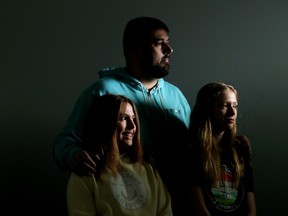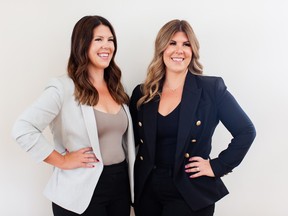
Article content
At first blush, the camp Jade Jones and her sister attended last summer near Sherwood Park sounds like an ordinary getaway for kids, with horses, swimming, games and crafts.
After the fun, though, the camp turned to a tricky topic.
Article content
“We talked about some background about all of our families, and how they got PTSD and everything,” said Jones, a Grade 6 student whose parents worked for the RCMP and Canadian military. “And there’s some videos and there’s some worksheets on PTSD and we learned more about it.”
Advertisement 2
Article content
Jones, 11, is one of hundreds of kids to participate in a program launched by Wounded Warriors Canada to help youth with parents whose work has left them with mental-health struggles.
Warrior Kids was created in 2019 by Jerris Popik and her sister Helena Hawryluk after years working with military families in Edmonton during Canada’s war in Afghanistan.
“What we were witnessing as social workers working with military families was just this very huge impact on the home front — what happens when military members were coming back with these invisible injuries,” Popik said. “Nobody quite knew (or) understood what that impact looked like to the children and the youth who were witnessing these really massive changes with their parents.”
Recommended from Editorial
Warrior Kids caters to youth whose parents have what are known as “operational stress” injuries — an umbrella term coined by the military that includes post-traumatic stress disorder.
Article content
Advertisement 3
Article content
“You don’t necessarily need to have diagnosed PTSD (to have an operational stress injury),” said Popik. “Lots of people don’t meet that diagnosis requirement, but still really, really need the supports.”
Jones’ dad, Brad Jones, spent 23 years with the Canadian Armed Forces, including deployments to Bosnia and Afghanistan. He was medically released from the military because of PTSD and other medical issues and now works in the public service, providing peer support to other veterans struggling with operational stress injuries.

“Our stressors that affect us, it doesn’t end when we get home,” he said. “Some of that impacts our family and our children. And they don’t understand some of the triggers we may have, different things that cause stress. It’s difficult for the kids to understand.”
Popik said youth can develop mental-health difficulties as a result of their parents’ on-the-job stress.
“There’s so much research that’s been put into understanding the secondary effects of trauma on children and youth that are living with parents who are first responders and military,” she said.
Advertisement 4
Article content
Warrior Kids launched five years ago with a summer camp for kids in Alberta, now held at Camp Van-Es, southeast of Edmonton. It also offers camps in B.C. and Ontario, as well as six-week virtual “psycho-educational” programs in the off-season.
The program starts with an intake during which parents are coached on talking to their kids about their struggles. The goal, Popik said, is to help kids understand operational stress injuries “and what it looks like specifically to them, living in a family with a parent with an invisible injury.”
Jade — whose favourite classes are math, gym and art — enjoyed her first experience at camp. She liked the people, and learned more about her parents and the impact of their work.
She said she remembers camp staff explaining PTSD and how it’s something her family will have to manage “forever.”
“I could understand more. Until they told me about it, I’m like, ‘Oh, wait, I did not know you guys actually had this. I didn’t know your job could make you get this and everything.’
“It’s a really great place and the people are very nice,” she said. “I have learned more about my parents and how they feel around us. And I just know what to do now and be prepared for around my parents.”
Article content





